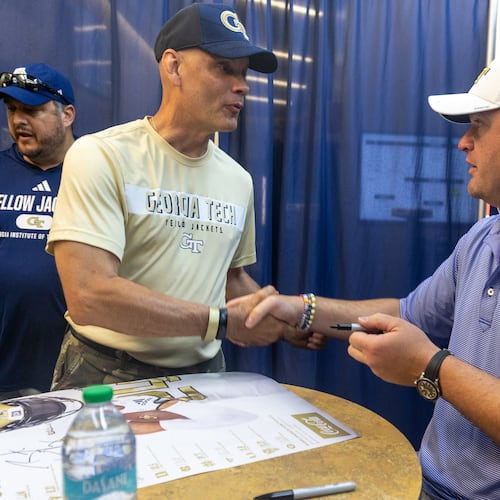In 2008, the NCAA voted to enact what came to be known as the "Nick Saban rule," which prevented head coaches from going on the road during the spring evaluation period. It was seen as a measure endorsed by other head coaches to dampen Saban's frenetic recruiting pace, which had helped the Crimson Tide land the No. 3 signing class in February 2008 at the end of his first full recruiting cycle in Tuscaloosa, Ala.
Georgia Tech general manager Patrick Suddes, who was on the Alabama staff as associate director of football operations, has another name for the Nick Saban rule in honor of Saban’s then-director of player personnel. He calls it the Geoff Collins rule.
“Because when Geoff was with Nick, he was sending Nick all over the place,” Suddes told the Atlanta Journal-Constitution. “So that since then, all the head coaches got together and said, ‘We don’t want to go out in the spring.’ Or I don’t know how it was decided, but no head coaches can go out.”
Collins played a similar role for Saban that Suddes now does for Collins – “air-traffic controller” – coordinating visits for the coaching staff to visit as many high schools and prospects as possible during the evaluation periods. (It bears mention that Saban was similarly engaged in spring recruiting while at LSU, and possibly at earlier stops, also.)
“(Saban) loves recruiting, so he was good with that,” Suddes said. “He got pissed when they made that rule.”
Suddes’ recollection of Collins is another glimpse into the nonstop and creative approach that he has taken toward recruiting and, since last December, has brought to Tech.
It was the same way at Alabama when Suddes went to Alabama with Saban from the Miami Dolphins and Collins was hired from Tech, where he had just helped assemble the ballyhooed 2007 class.
“Just a guy that had unlimited energy and unlimited ideas,” Suddes said. “The dude just had 1,000 ideas every day.”
At first, Suddes was skeptical about Collins’ drive.
“Oh, no doubt,” Suddes said. “My first week on the job, I was like, there’s no way he can be like this.”
But, after time, Suddes realized that that was Collins.
“What you see is what you get,” Suddes said. “He’s like that 24/7. He’s always high-energy, he’s always upbeat. And the best thing about him, he brings such a positive energy.”
Among Collins’ ideas, back in a pre-Twitter time, were different ways to get prospects’ attention.
“Back then, you couldn’t even send out color graphics,” Suddes said. “So he would create newspaper articles and all this kind of stuff in black and white and he would send that out. He created all different types of business cards. Just kind of outside-the-box stuff. I think we had, like, coaches’ cards that were kind of like playing cards. We had their stats and stuff on the back. Just those kinds of things, he was unbelievably creative with.”
Collins evidently was impressed with Suddes as well. In a January news conference, Collins called him “one of the integral pieces of helping set up the infrastructure for recruiting, for the operations that we did over in Tuscaloosa and was a valuable member of the staff, and he understands the blueprint of how we do things.”
Suddes said that, even then, Collins already was enamored with the idea of becoming head coach at Tech.
“Always talked about it,” Suddes said. “And he said then – originally, he said he was going to hire me as his DB coach. I think he said it when we were at Alabama. But I got out of the coaching game, but we always talked about, ‘If you came to Tech, I’m there, 100 percent.’ Just kind of came to fruition. It usually doesn’t work out as planned, but it did.”
About the Author
Keep Reading
The Latest
Featured


